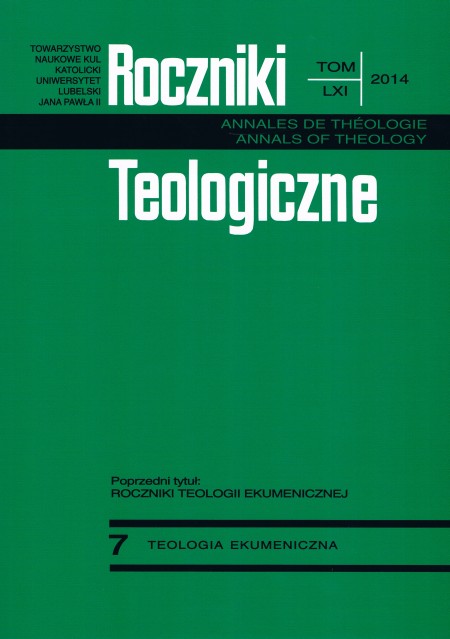Ecclesiastical/Ecumenical Diplomacy during and after Second Vatican Council. Old and New Orthodox Notes and Comments
Ecclesiastical/Ecumenical Diplomacy during and after Second Vatican Council. Old and New Orthodox Notes and Comments
Author(s): Nicu DumitraşcuSubject(s): Christian Theology and Religion
Published by: Towarzystwo Naukowe KUL & Katolicki Uniwersytet Lubelski Jana Pawła II
Keywords: ecumenism; Second Vatican Council; ecclesiastical diplomacy; Church; ecclesiology
Summary/Abstract: Despite the optimism following the announcement of an ecumenical council by Pope John XXIII, as well as the visit of Pope John Paul II to Bucharest, the first such visit by a Pope to a majority Orthodox country, Orthodox-Roman Catholic relations have not improved to the degree that was originally hoped. The author argues that this is largely due to a dichotomy between Roman Catholic ecumenical diplomacy, tracing the manner in which Pope John Paul II’s actions in Romania made huge strides towards the reconciliation of both of these Christian traditions, and the language issuing from the Vatican, which would seem to preclude any such reconciliation. This involves the Vatican’s use of terminology which is unacceptable to the Orthodox world, such as restrictions of the use of the term “sister Church.” Thus the Catholic Church argues that it should be regarded as the mother Church: only the local Church of Rome can be considered the sister Church of private Churches. This suggests that the Vatican’s approach to ecumenism is to encourage Orthodox Churches to follow the example of the Greek Catholic Churches, i.e. union with Rome. In fact the Uniate Churches could be considered more of a barrier, rather than a bridge, to ecumenism, since they are typically regarded with great circumspection by Orthodoxy. This type of attitude is also expressed in Mysterium Ecclesiae, which damaged faith in the partnership with Rome, and the nature of the ecumenism promoted by it. It is to be hoped that not only the Catholic Church, but also other Christian confessions, will employ ecumenical flexibility, which can only be done in a spirit of reconciliation, not of confrontation.
Journal: Roczniki Teologiczne
- Issue Year: 61/2014
- Issue No: 07
- Page Range: 83-101
- Page Count: 20
- Language: English

